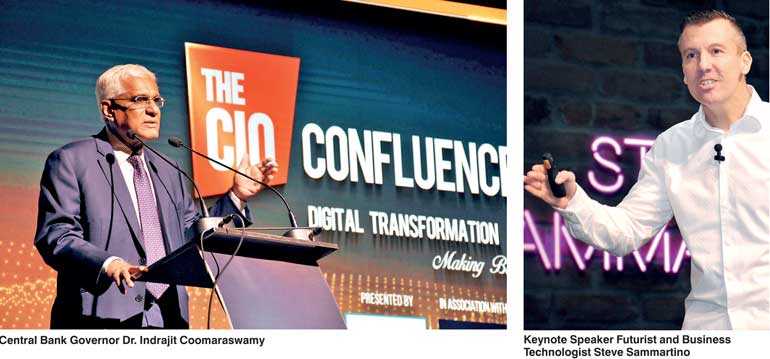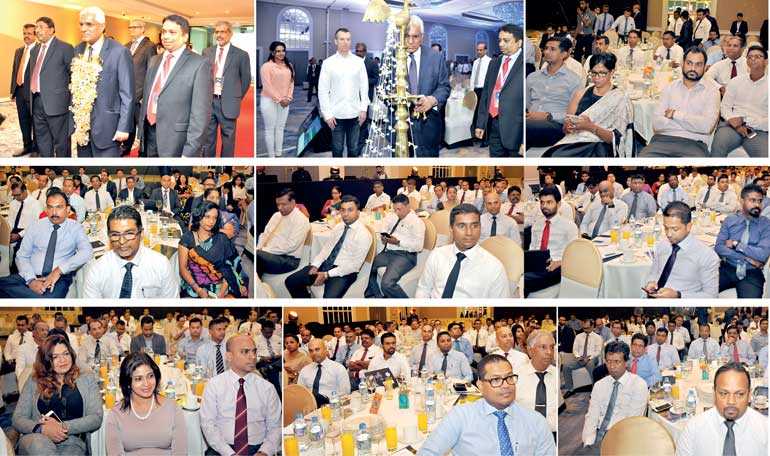Thursday Feb 26, 2026
Thursday Feb 26, 2026
Monday, 27 August 2018 00:00 - - {{hitsCtrl.values.hits}}

By Charumini de Silva
Central Bank Governor Dr.Indrajit Coomaraswamy last week called on IT experts of the banking and finance industry to collaborate achieving a ‘less cash’ society by creating a balance between regulation and innovation, to ensure digital transformation in Sri Lanka.
Addressing at the fourth edition of the CIO Confluence 2018 titled ‘Digital Transformation – MakingBanking Invisible’ organised by the bank’s CIO Forum (BCIOF), Dr.Coomaraswamy highlighted that the digital transformation is not just about digital technology, but also about allowing people to solve their traditional challenges in a more optimised and efficient manner.
“As a country, digital transformation allows us to increase our economic output through, optimisation of time and opportunities provided by the ever advancing technologies. Efficiency gains have increased productivity, thereby creating the enabling conditions for higher profitability and enhanced incomes. The adaptation to digital transformation by financial sector Institutions has grown rapidly and is now an integral part of operational strategies,” he said.
Noting that Central Bank envisions achieving its less cash society initiative via digital transformation by creating a balance between regulation and innovation, he stressed that this vision can be achieved only through the cooperation of all players in the finance and banking ecosystem as ithas ultimate responsibility to the people and the Government of the country for the safety and security of payment systems.
“The Central Bank is fully supportive of digitalisation and the use of new technologies to promote a less cash society in Sri Lanka through the use of new cashless payment mechanisms such as digital banking accounts, smart mobile apps, mobile wallets, QR code payments, nickname-based payments, initiatives on e-commerce payments and cross border payments,” he added.
He said that the Central Bank has also initiated a National Level Transit Card to reduce the cash-based transactions involved in daily passenger transportation, where the value stands at Rs.12 billion per month at present. However, he noted that the Government has to take necessary steps to implement this system, which will also complement the Central Bank’s vision of a less cash society.
Further highlighting initiatives taken to maximise financial inclusion in the country, Dr.Coomaraswamy asserted that they have identified major barriers to accessing the rural unbanked and under-banked population and initiated digital transformation with the introduction of the ‘LANKAQR’ code payment mechanism based on the EMV standard with a proposed model for interoperability.

“The Sri Lankan payment industry will benefit immensely from having a QR code standard implemented in the payment ecosystem of the country. The usage of QR codes for payments eliminates the requirement for customers to carry cash or payment cards and for merchants to invest in high cost Point-Of-Sale devices to process transactions,” he said. The Governor believes by following a standardised QR code payment method, the financial institutions will be able to provide access to low cost and secure digital payments to customers and merchants, while the standardised QR code will eliminate a multitude of QR codes being displayed by merchants
Dr.Coomaraswamy said the Central Bank is confronted with the complex challenge of aiding the adoption of technology, while taking precautions to minimise risks associated with technological innovations to achieve the appropriate mix of innovation and stability.
Pointing out that the Central Bank is also actively engaged with sectors such as banking and finance, payments and settlements, information and communication technology and telecommunications in relation to initiatives on FinTech and Blockchain technologies, he revealed that all these are required to be compliant with the prevailing laws and regulations of the Central Bank and the country.
With the rapid growth in FinTech innovations in the country, Dr.Coomaraswamy said the Central Bank has identified the need to provide an environment that nurtures and promotes their advancement, while maintaining appropriate regulatory standards.
Accordingly, the Central Bank recently announced its intention to establish a FinTech Regulatory Sandbox to promote and nurture FinTech innovations.
“Regulatory technology, or RegTech, is a new field within the financial services industry that utilises information technology to enhance regulatory processes. The objective of RegTech is to enhance transparency as well as consistency and to standardise regulatory processes and thus provide higher levels of quality at lower cost. Currently, the Central Bank is focusing on the possibility of digital transformation of manual reporting and compliance processes, for example in the context of Know Your Customer (KYC) requirements,” he added. However, Dr.Coomaraswamy emphasised that most FinTech and RegTech initiatives are being held back due to the delay in the introduction of the Digital National Identity Card project. “We now have to expedite these processes with the relevant authorities to embrace the digital transformation in the banking and finance sector,” he stressed.
He assured the Central Bank has not given any license or authorisation to any entity or company to operate cryptocurrencies and their trading in Sri Lanka, a stance that is in line with many other countries in the region and beyond.
Realising the importance of national initiatives on cybersecurity preparedness in the financial sector in Sri Lanka, he said the Central Bank has taken various initiatives. “The Central Bank together with LankaClear Ltd., established the FinancialSector’s Certificate Authority ‘LANKASIGN’. We also issued the ‘Baseline Security Standard for Information Security Management – Version I’ mandating all the banks to comply by 30June 2015 and version 2 is currently under review.Recently, we issued ‘Minimum ComplianceStandards for Payment Related Mobile Applications Guideline No.1 of 2018’ mandating all Payment Service Providers to provide a minimum compliance standard to be adopted covering the entire payment related mobile applicationeco-system with effect from 18 January 2018,” he added.
Pix by Lasantha Kumara
